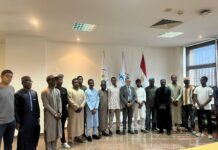OUR EVIDENCE-BASED CONTRIBUTION TO YOUR FIGHT AGAINST THE COVID-19 PANDEMIC
By Ibrahim Kareto and Dr Abdulrahman Adamu
To our amiable and listening Governor, Eng. Professor Babagana Umara Zulum FNSE.
The COVID-19 pandemic has become a social phenomenon where in low and middle-income countries, response to COVID-19 is much more complex than in the high-income countries. The population in those counties are sharply divided between those who see it as a ‘survival threat’ and therefore want a complete and total lockdown and the people who see the pandemic as a mere palaver and therefore welcome no restrictions of whatsoever nature. Make no mistake that the former are people who either live ‘a month wage away from financial disaster’ or have the guarantee of their incomes even when there are restrictions in place. While the latter are usually people who live ‘a day’s wage away from financial disaster’. In the end, the division boils down to a struggle for survival!
Reasons for lockdown
1- To delay the spread, also known as ‘flattening the curve’. This is deliberately done to slow the spread of the virus, so countries or states can upgrade their medical infrastructure and equipment.
2- Lockdowns are enforced for easy tracing and testing of the contacts of infected persons. Is Nigeria doing enough on this, are all persons making phone calls to the Nigeria Centre for Disease Control (NCDC) getting the desired attention? Kano, for example, a state with a population of about 15 million people has its only COVID-19 test laboratory shut down during this crises.
We have a rising curve, so now what can we do?
According to a new study from the Imperial College, London, there are two types of lockdowns;
1- Mitigation
2- Suppression
The former entails the slowing down but not necessarily ‘stopping’ the spread of the epidemic. This can be achieved through identification and isolation of suspected cases and their households and take urgent steps to protect the vulnerable (the elderly and the people with underlying health problems) that are at risk of developing serious illness from the virus.
While the latter is the ‘complete lockdown’ which aims to stop the spread of the virus and bring the number of infected persons to zero within a very short time. This can be achieved through physically distancing the entire population (complete lockdown).
Nigeria needs to strictly adopt and implement one between these two approaches; either to SLOW DOWN (mitigation) the spread of the virus or to REVERSE THE GROWTH (suppression) of the epidemic. We are indeed caught between a rock and a hard place. The sad reality however, is that community transmission of the virus is ongoing. This means that lives would be lost.
So which one works well? Of course, the complete lockdown. Although experts have warned that it is too early to conclude, the entire Hubei province of China have successfully experimented this method and succeeded in bringing the number of coronavirus cases to zero within two months. The way we interact with each other, the structure we live in, our family structure, population density and in general, the societies we live-in pose different challenges and requires a specific response. Can we deploy it here in Nigeria? Definitely no! So, why not? The onus lies on the government to ensure people still access basic needs during lockdowns, especially food. Let’s be realistic, different levels of government in Nigeria cannot afford to feed the majority of Nigeria’s population which are living below the poverty line for two months or more. Therefore, this model is near impossible to be successfully implemented here.
Way forward
Protecting them is more cost-effective than treating or burying them. We recommend that government should urgently either redirect its resources that were meant for palliatives or mobilize more financial resources to take steps to protect the elderly and the people with underlying health problems that are more likely to develop serious illness from the virus (this can be done through meticulous planning and uncommon political leadership). This, if successfully done, will greatly slow the epidemic, hospitalization and reduce the number of death by halve. It is achievable. Data available from New York City’s (NYC’s) health department indicates that children below the age of 18 years have zero death per 100,000 cases. Whereas, people who are 70 years and older have the highest rate, i.e 1000 per 100,000. However, it is important to note that the figures may vary, depending on peculiarities of countries, regions or even states. In addition, places with poor health facilities, high poverty rate, overpopulation and lack of citizen awareness were proved to experience a higher mortality rate.
These are trying times, and this fight cannot be left to government alone. Therefore, Government should call for a fundraise that will see Civil Society Organisations (CSOs), Cooperate bodies and individuals donating to help the fight against COVID-19.
It isn’t a choice, but rather a responsibility and a duty to one’s country or state for everyone to educate as many people as he can on the novel coronavirus and its preventive measures.
Launching of a massive campaign to let people know what is really happening. Many people don’t know what’s going on. There are no existing data to show the number of people that still either don’t believe in the virus or don’t know how to protect themselves. The best way to establish this is through a proxy data of literacy rate in Borno state. For example, a 2012 UNESCO action plan document shows that Borno state has the least literacy level with only 14.5 per cent of the entire population being literate. This underscores the gravity of the problem we are faced with.
There’s evidence that face masks reduce transmissions. However, not all face masks are effective. We suggest that part of the government’s protection strategy should be a quick research to find the most effective material available, production and distribution of free or low-price face masks to citizens, especially the vulnerable. One million face masks can be produced in one week if the right person’s would be identified to do this. We call on humanitarian and philanthropic organisations too to get involved in this.
Calculate the best and the worst-case scenarios of your strategies. Inform the citizens about the UNCOMFORTABLE outcome of the scenarios. That way, citizens will be faced with nothing other than the reality, and they will be forced by their conscience to act responsibly. But if the government fails to do that, should the pandemic takes a toll on the population, it might be a disastrous breakdown of respect and trust people have for the Prof. Governor.
Scenarios will also inform the government on which among different strategies is best for us.
Citizens’ lack of trust from institutions. This is a long term accumulated distrust between the governed and the government. I do not know how the government intends to address this for immediate benefit but there’s no doubt that this is a serious setback.
Call for a large volunteer pool. The Governor should appeal and call on well-meaning citizens to volunteer for the fight against the COVID-19. Recruit the volunteers, train them and wait for our peak period, which might not look good.
The novel coronavirus is an emerging challenge and is purely a scientific matter. Therefore, our able and amiable governor should ensure the inclusion of a scientific research component within the state COVID-19 response committee or constitute another committee separately as he deems it fit. This component will ensure all decisions by the state COVID-19 response committee are based on factual scientific evidence (as they emerge) and suitability to our peculiarities. And not just implement what other countries are also implementing.
We cannot overemphasize the ramping up of contact tracing, testing and isolation of cases.
Markets, barbershops, women hairstyle shops, public transports should NOT operate. ATMs should also be well managed. Identify all other high-risk places and manage them well.
People are still attending funerals and religious congregations. This singular attitude is enough to ridicule the lockdown policy as a waste. This needs to be stopped for now. It will all come to pass anyway.
Lastly, Sir, in this fight against COVID-19, mistakes are disastrous and can cost us thousands of lives. Also, decisions taken a day late would have always saved hundreds or rather thousands of lives. Good luck and best wishes. We will continue to pray for Allah to guide, protect and give you more strength. Sir, you have started well and so shall you end well!
Our Strategy
Tracing, documenting and protecting the vulnerable.
Kareto is trained in the UK. He is vastly experienced and interested in sustainable development while Dr Adamu is an experienced UK trained virologist.
Follow the Neptune Prime channel on WhatsApp:
Do you have breaking news, interview request, opinion, suggestion, or want your event covered? Email us at neptuneprime2233@gmail.com






Wonderful write-ups, very educative indeed